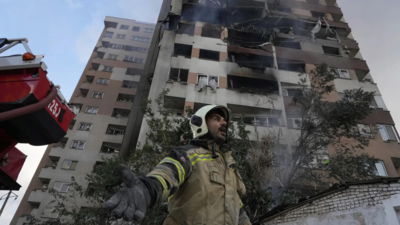ARTICLE AD BOX

Israel strikes Iran. (AP photo)
Israel on Friday initiated a significant military operation against Iran. Explosions occurred in Tehran as Israel conducted strikes on Iranian nuclear and military installations.
Iranian media confirmed the deaths of the Revolutionary Guard commander and two prominent nuclear scientists.Israeli forces targeted nuclear facilities and eliminated the Revolutionary Guard leader. Israeli officials stated the operation aimed to prevent Iran from developing nuclear weapons, as the country approaches weapons-grade uranium enrichment capabilities. Iran maintains its programme's peaceful nature, and US intelligence assessments indicate Iran isn't actively developing weapons.Prime Minister Benjamin Netanyahu announced that the strikes targeted the Natanz enrichment facility and prominent nuclear scientists, alongside Iran's ballistic missile arsenal.Iranian state television confirmed Gen. Hossein Salami's death, a crucial Revolutionary Guard commander.Tehran residents witnessed significant explosions. State television showed damaged residential buildings with collapsed walls, fires, and broken windows throughout the capital, reporting the Revolutionary Guard headquarters was ablaze.
Why has Israel launched a military operation?Israel has launched a military operation in response to what it views as an immediate and existential threat posed by Iran’s nuclear program. According to the Israeli government, the current regime in Iran has consistently promoted the destruction of the State of Israel—not merely as a political stance, but as a core directive. Israel said in a statement that Iran made substantial military investments to strengthen its capability, including the clandestine development of a nuclear weapons program.
Israel alleges that while Iran engaged in diplomatic negotiations, it continued advancing its nuclear capabilities in secret, using diplomacy as a cover. Israel quoted findings from International Atomic Energy Agency (IAEA) that claim that Iran’s nuclear activities are aimed at military objectives rather than peaceful energy production. Alongside its uranium enrichment efforts, Iran also reportedly developed advanced missile delivery systems and other technologies essential for weaponizing its nuclear program.Why is Israel attacking now? Israel argues that immediate action was necessary because Iran is believed to be just moments away from acquiring a functional nuclear weapon. The volume of highly enriched uranium reportedly amassed by Iran is said to be sufficient for more than nine nuclear bombs, with a third of that quantity produced in just the past three months. "Recent intelligence shows Iran is nearing the point of no return in its race toward a nuclear weapon.
The regime is producing thousands of kilograms of enriched uranium, alongside decentralized and fortified enrichment compounds, in underground, fortified sites. This program has accelerated significantly in recent months, bringing the regime significantly closer to obtaining a nuclear weapon," Israel Defence Forces (IDF) said in a statement."The Iranian regime has been working for decades to obtain a nuclear weapon.
The world has attempted every possible diplomatic path to stop it, but the regime has refused to stop. The State of Israel has been left with no choice. The IDF has the obligation to act in defense of the civilians of Israel and will continue to do so," IDF added.What was the operation's purpose?The military operation, according to Israel, is a last-resort measure undertaken in self-defense. The campaign is said to be highly targeted, focusing solely on military sites and facilities linked to Iran’s nuclear weapons program. Israeli authorities emphasise that the Iranian people are not the target; rather, the operation aims at neutralizing the radical elements that pose a direct threat to Israel’s security. Additionally, Israel claims it is taking all possible precautions to minimize civilian harm during the operation.
This rapid escalation occurred even as Iran was involved in negotiations with the United States, which Israel sees as a sign of bad faith.
Israeli officials believe that the pace and scale of Iran’s nuclear advancement in recent months have not been seen in over two decades, further justifying the urgency of their response.Iran's primary enrichment facilities are located at Natanz and Fordo. These installations are fortified against aerial attacks, with Natanz built underground and Fordo constructed within a mountain.The facilities remain central to recent diplomatic efforts. The former US president cautioned Netanyahu against attacking whilst negotiations continued.US envoy Steve Witkoff was scheduled to meet Iranian representatives in Oman. The strikes' impact on future negotiations remains uncertain.



.png)
.png)
.png)
















 1 day ago
7
1 day ago
7









 English (US) ·
English (US) ·